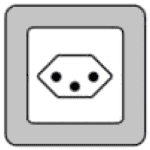Plug For Switzerland: What You Need To Know
What is the plug for Switzerland? Before you travel, check the information below to make sure your electronic devices are compatible with the outlet type and voltage.
Electrical Summary
Switzerland uses outlet types C, J at a voltage of 230V and a frequency of 50 Hz.
Plug Compatibility: Type C, Type J (SN SEV 1011:2009)
Voltage: 230V
Frequency: 50 Hz
Type C

Type J

Can North Americans use Electronics in Switzerland without an Adapter?
No! North Americans will need an adapter for the outlets and a transformer for the voltage when traveling to Switzerland. North Americans device plugs will not work with the outlet types in Switzerland. Also, the voltage in Switzerland is different from North American voltages.
Can Europeans use Electronics in Switzerland without an adapter?
Yes! Most Europeans do not need a travel adapter or transformer when traveling to Switzerland. Most device plugs will work with the outlet types in Switzerland. Also, the voltage in Switzerland is the same as in Europe.
What Outlet does Switzerland Use?
Type C

Type C plug sockets are used in Europe, Africa and Asia. They have two round pins and no grounding pin. These plugs are typically used with devices that have a voltage of 220-240V. This outlet is rated for 2.5 amps. Plug Type E, and Type F are compatible with this socket. All other plug types will need an adapter.
Type J

Type J plug sockets are used in Switzerland and Liechtenstein. They have three round pins and a grounding pin. These plugs are typically used with devices that have a voltage of 230V.
Is it safe to drink water in Switzerland?
To be on the safe side, you can use common precautions such as boiling tap water for at least one minute, using water purification tablets, or drinking bottled water. It’s also important to note that ice may be made from tap water and that foods may be washed or prepared with tap water.
We recommend always packing a filtered water bottle when traveling:
Travel Essentials
Be sure to check our list of travel essentials before your trip!
Should I get travel insurance when traveling to Switzerland?
It is generally recommended to get travel insurance when traveling to a different country. Travel insurance can provide financial protection and peace of mind in case of unexpected events, such as medical emergencies, trip cancellations, lost or stolen baggage, or other travel-related mishaps.
Travel insurance can cover various expenses related to your trip, such as medical expenses, emergency medical transportation, trip cancellation or interruption, lost or stolen baggage or personal belongings, and other travel-related expenses.
Before purchasing travel insurance, it’s important to carefully review the policy details, including the coverage limits, exclusions, and any applicable deductibles or copays. You should also make sure that the policy covers any activities or destinations that you plan to participate in or visit during your trip.
Travel Summary
Visitors to Switzerland can enjoy a range of outdoor activities, including skiing, snowboarding, hiking, and mountain biking in the Swiss Alps. The country is also home to several famous ski resorts such as Zermatt, St. Moritz, and Verbier. During the summer, Switzerland’s lakes and mountains offer opportunities for swimming, boating, and fishing.
In addition to its natural beauty, Switzerland is also known for its vibrant cities and cultural attractions. The city of Zurich, for example, is known for its charming old town, museums, and art galleries. The Swiss capital, Bern, is a UNESCO World Heritage Site with a picturesque medieval old town, while Geneva, home to many international organizations, offers a cosmopolitan atmosphere and stunning views of Lake Geneva.
Switzerland is also famous for its chocolate, cheese, and wine, and visitors can sample these delicacies at local shops and markets. The country’s cuisine is influenced by its neighbors, France, Germany, and Italy, and features a variety of dishes made with fresh ingredients, including rosti, raclette, and fondue.
Overall, Switzerland offers a unique travel experience with a mix of stunning alpine scenery, vibrant cities, and rich cultural heritage. Whether you’re looking for outdoor adventures or cultural attractions, Switzerland has something for everyone.
Traveling to another country? Check out our Countries page for more info.